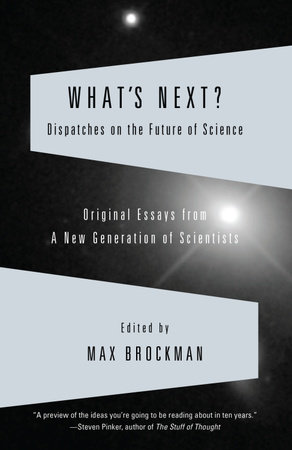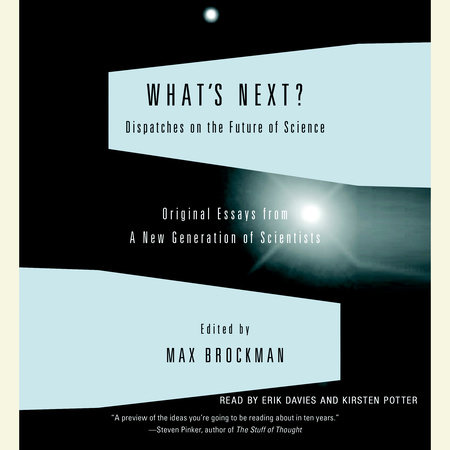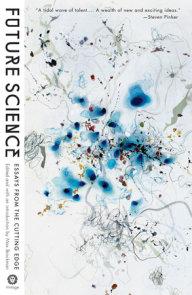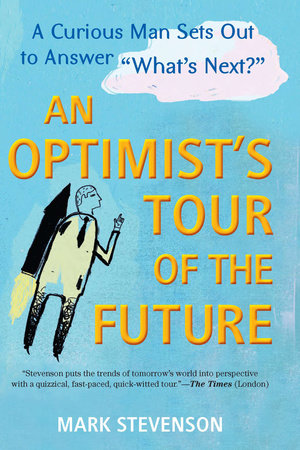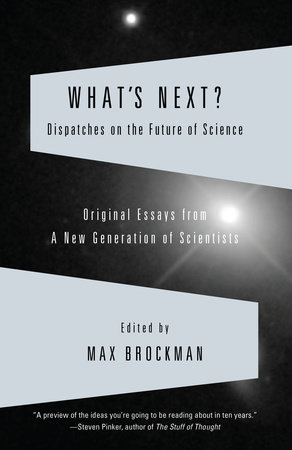

What's Next
By Max Brockman
By Max Brockman
By Max Brockman
By Max Brockman
By Max Brockman
Read by Erik Davies and Kirsten Potter
By Max Brockman
Read by Erik Davies and Kirsten Potter
Category: Science & Technology
Category: Science & Technology
Category: Science & Technology | Audiobooks

-
$18.00
May 26, 2009 | ISBN 9780307389312
-
May 26, 2009 | ISBN 9780307456656
-
May 26, 2009 | ISBN 9780307577450
436 Minutes
Buy the Audiobook Download:
YOU MAY ALSO LIKE

The Bed of Procrustes
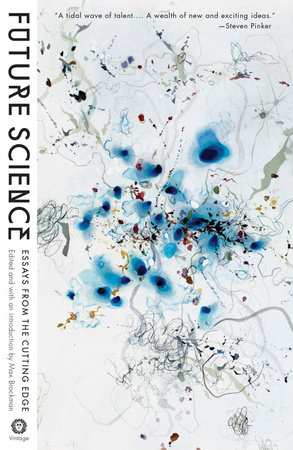
Future Science

Euclid in the Rainforest
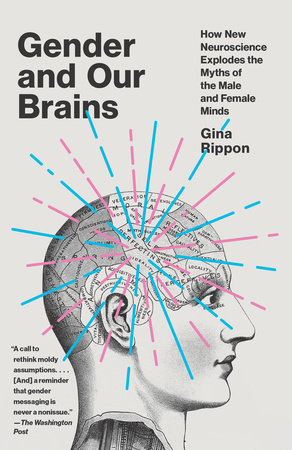
Gender and Our Brains
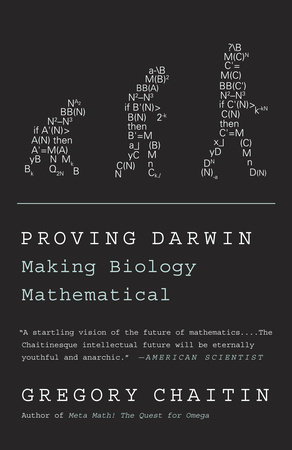
Proving Darwin

Draw Your Weapons

The Science of Success

Quanta and Fields

An Intelligent Person’s Guide to Philosophy
Praise
“Captivating. . . . Diverse. . . . While each essay is its own gem, together they form a remarkable dialogue about what it is to be human now, and what it will be in the future. . . . Fascinating.”
—New Scientist
“Like reading a set of interesting blog posts, but on paper. And most of these folks don’t have blogs!”
—Discover Magazine’s “Things Going On” blog
“Engrossing. . . . Offers a youthful spin on some of the most pressing scientific issues of today—and tomorrow. . . . Super smart and interesting.”
—New York Observer’s “Very Short List”
“A fantastic cross-section of societal concerns, focusing largely on issues of ethics and the human mind. . . . This absorbing collection makes easy-to-read but thought-provoking material for even casual science buffs.”
—Publishers Weekly
“Capaciously accessible, these writings project a curiosity to which followers of science news will gravitate.”
—Booklist
“If these authors are the future of science, then the science of the future will be one exciting ride! Find out what the best minds of the new generation are thinking before the Nobel Committee does. A fascinating chronicle of the big, new ideas that are keeping young scientists up at night.”
—Daniel Gilbert, author of Stumbling on Happiness
“A preview of the ideas you’re going to be reading about in ten years.”
—Steven Pinker, author of The Stuff of Thought
Table Of Contents
Max Brockman: Preface
Laurence C. Smith: Will We Decamp for the Northern Rim?
At stake is no less than the global pattern of human settlement in the twenty-first century.
Christian Keysers: Mirror Neurons: Are We Ethical by Nature?
Evolution has equipped our brains with circuits that enable us to experience what other individuals do and feel.
Nick Bostrom: How to Enhance Human Beings
Given our rudimentary understanding of the human organism, particularly the brain, how can we hope to enhance such a system? It would amount to outdoing evolution. . . .
Sean Carroll: Our Place in an Unnatural Universe
The early universe is hot and dense; the late universe is cold and dilute. Well . . . why is it like that? The truth is, we have no idea.
Stephon H. S. Alexander: Just What Is Dark Energy?
Dark energy, itself directly unobservable, is the most bewildering substance known, the only “stuff” that acts both on subatomic scales and across the largest distances in the cosmos.
Sarah-Jayne Blakemore: Development of the Social Brain in Adolescence
Using modern brain-imaging techniques, scientists are discovering that the human brain does indeed change well beyond early childhood.
Jason P. Mitchell:Watching Minds Interact
Perhaps the least anticipated contribution of brain imaging to psychological science has been a sudden appreciation for the centrality of social thought to the human mental repertoire.
Matthew D. Lieberman: What Makes Big Ideas Sticky?
Big Ideas sometimes match the structure and function of the human brain such that the brain causes us to see the world in ways that make it virtually impossible not to believe them.
Joshua D. Greene: Fruit Flies of the Moral Mind
People often speak of a “moral faculty” or a “moral sense,” suggesting that moral judgment is a unified phenomenon, but recent advances in the scientific study of moral judgment paint a very different picture.
Lera Boroditsky: How Does Our Language Shape the Way We Think?
Language is a uniquely human gift, central to our experience of being human. Appreciating its role in constructing our mental lives brings us one step closer to understanding the very nature of humanity.
Sam Cooke: Memory Enhancement, Memory Erasure: The Future of Our Past
Once we come to understand how our memories are formed, stored, and recalled within the brain, we may be able to manipulate them—to shape our own stories. Our past—or at least our recollection of our past—may become a matter of choice.
N
Deena Skolnick Weisberg: The Vital Importance of Imagination
One of the main ways in which both adults and children learn about the world around them is by asking “What if?” using their imagination to think about what might have happened in the past or what might happen in the future. Far from being used only for childhood games or daydreams, this ability to get outside of reality can have profound effects on our interactions with reality.
David M. Eagleman: Brain Time
The days of thinking of time as a river—evenly flowing, always advancing—are over. Time perception, just like vision, is a construction of the brain and is shockingly easy to manipulate experimentally.
Vanessa Woods and Brian Hare: Out of Our Minds: How Did Homo sapiens Come Down from the Trees, and Why Did No One Follow?
In the six million years since hominids split from the evolutionary ancestor we share with chimpanzees and bonobos, something happened to our brains that allowed us to become master cooperators, accumulate knowledge at a rapid rate, and manipulate tools to colonize almost every corner of the planet.
Nathan Wolfe: The Aliens Among Us
While viruses have to infect cellular forms of life in order to complete their life cycles, this does not mean that causing devastation is their destiny. The existing equilibrium of our planet is dependent on the actions of the viral world, and its elimination would have profound consequences.
Seirian Sumner: How Did the Social Insects Become Social?
We would like to know what the conditions and selection pressures were that tipped the ancestors of the eusocial insects over the ledge and down toward eusociality.
Katerina Harvati: Extinction and the Evolution of Humankind
It is now clear that humans (whether fossil or living) are not immune from biological forces and that extinction was (and, indeed, is) a distinct possibility.
Gavin Schmidt: Why Hasn’t Specialization Led to the Balkanization of Science?
Even as scientific output has increased exponentially, concerns have been raised that growing specialization will end by making it impossible for scientists in different fields to communicate, let alone collaborate.
Acknowledgments
21 Books You’ve Been Meaning to Read
Just for joining you’ll get personalized recommendations on your dashboard daily and features only for members.
Find Out More Join Now Sign In








